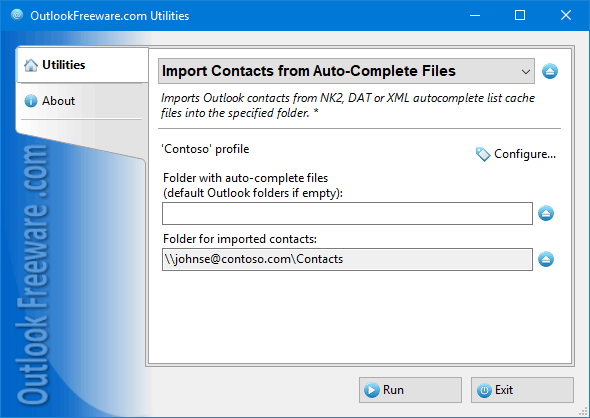Import Contacts from Auto Complete Files
Imports Outlook contacts from NK2, DAT or XML autocomplete list cache files.
Free tool for importing Outlook contacts from NK2, DAT or XML autocomplete list cache files into the specified folder. Sometimes, because of failed migrations or mistakes, important contacts in Outlook contacts folders may be lost. Although contacts are gone, some contacts can still be recovered from the Auto-Complete List cache files. This free utility creates Outlook contacts from Auto-Complete Lists. If the folder with Auto-Complete files is not specified, the utility uses a default folder with Outlook data files for the current user. All contacts found in NK2, DAT, and XML Auto-Complete files will be imported into the specified contact folder. When importing, the utility checks contacts for duplicates; same addresses are ignored. If you have several Auto-Complete List files (for example, for different Outlook profiles or users), there is an option to create separate contact folders for each AutoComplete file. In this case, multiple subfolders will be created in the destination folder named after imported files. The utility imports each Auto-Complete List file into the appropriate folders. In this case, duplicate detection does not occur. Our blog provides more details and hints on using Outlook Auto-Complete Lists.
Changes: New features and enhancements.
Minimum requirements: Microsoft Outlook 2003/2007/2010/2013/2016/2019/365
Operating system: Win7 x32,Win7 x64,WinServer,WinVista,WinVista x64,WinXP,Windows 8,Windows 10
Program URL: http://www.outlookfreeware.com/en/products/all/outlookautocompleteimportcontacts
G+ Twitter FacebookImport Contacts from Auto Complete Files screenshot

Special permissions
You may distribute this version of OutlookFreeware.com Utility over the internet and include it in any CD compilation WITHOUT any kind of modifications.
EULA
License Agreement OutlookFreeware.com Utilities and Runtime Copyright (C) Relief, LLC. OutlookFreeware.com Utilities and Runtime (the "Software") are free for use in any non-commercial, non-profit environment, including but not necessarily limited to personal and academic. "Free" in the preceding sentence means that there is no cost or charge associated with the installation and use of the Software.